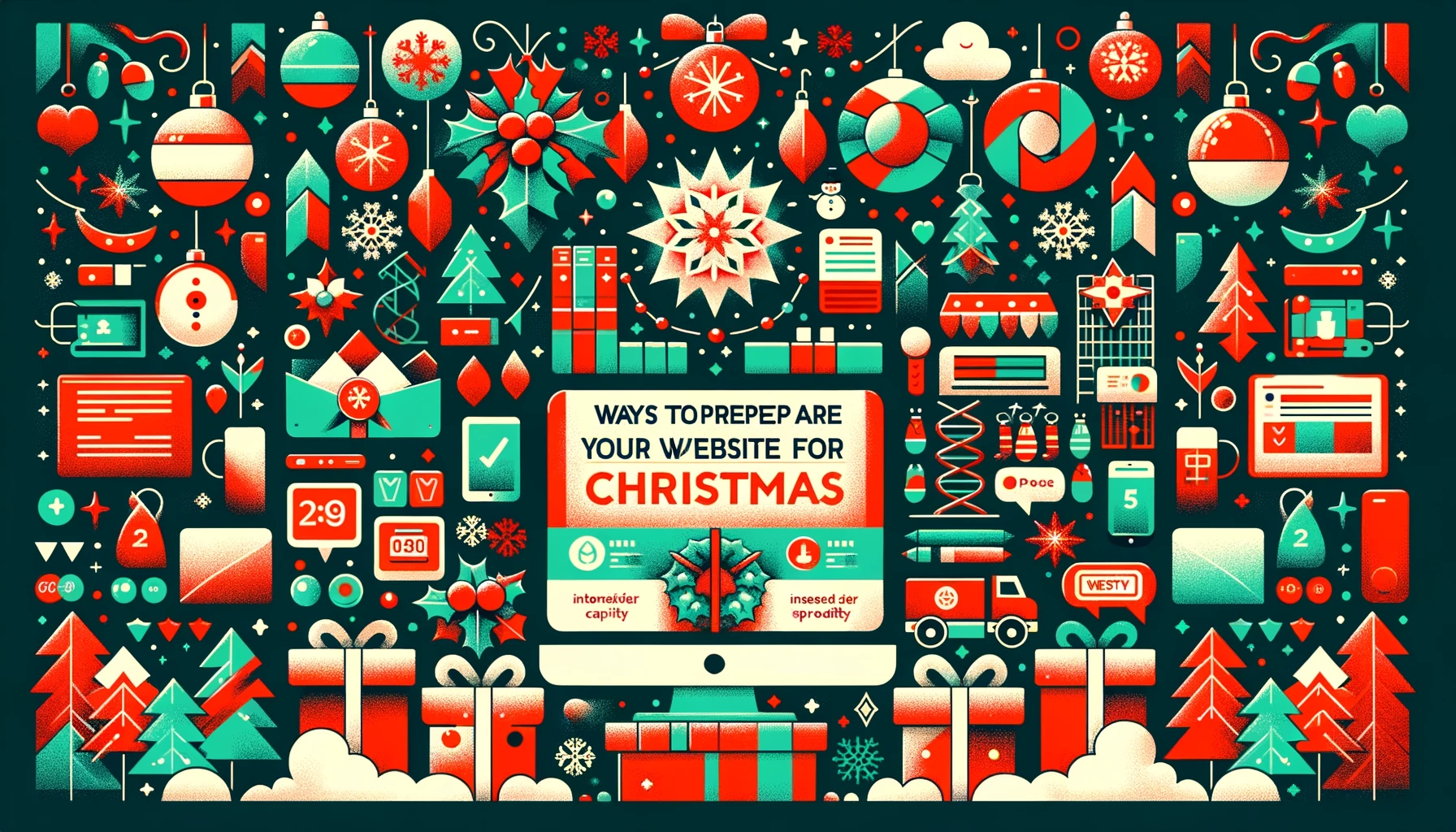5 ways to prepare your website for Christmas

Christmas is the busiest and most profitable time of the year for most shops, with millions of shoppers taking to the streets to stock up on food, drinks, and gifts for loved ones. Businesses can expect a huge increase in sales across nearly every industry as shoppers scramble to get presents for their family and friends. The last decade has also seen shoppers utilising the internet more and more to purchase gifts for the holiday season; meaning if you run an online shop, you can use Christmas to boost your sales and help grow your business.
Running an online store doesn’t mean that you’ll have it easy though – Christmas means that you will have to accommodate for the potential influx of new customers and website visitors. In order to give yourself the best chance of growing your business and attracting customers, you should consider making some preparations!
In this post we’ll explain some of the easiest ways you can prepare your website for the holiday season.
1. Prepare and plan holiday promotions
Since the holiday season can be the most lucrative time of the year for so many businesses, there’s a good chance you’re going to want to take the opportunity to prepare and plan a holiday promotion for your website.
You’re no doubt familiar with the concept of holiday promotions and sales. You will have seen christmas sales, boxing day sales, and black friday sales plastered all over the internet, television, and other forms of media. You may have even taken advantage of these sales to pick up something at a discounted price!
Christmas is a great time to provide discounts for products on your website to increase sales, or promote new services to expand your business. As consumers are more likely to be on the lookout for good deals, you’ll find that promotions can be significantly more successful around this time of the year.
Holiday promotions can be implemented in a number of different ways. The most common type of holiday promotion is a simple discount on existing products: think 50% off, 75% off etcetera. While this type of promotion has the potential for success, you may find that because so many companies do this at christmas, you won’t stand out among the crowd. Sure, existing customers might be more incentivised to buy something, but unless you’re advertising heavily discounted prices you might find that your promotion is just too similar to what other shops are offering.
Giveaways are another popular promotion to run during the holiday season. This is often implemented by getting people to sign up to a mailing list, from which the winner is randomly chosen. Another method is to get people to share your social media pages or posts, and then a winner is chosen from everyone who shared the content. Both methods can work successfully if properly implemented however mailing lists are usually used for collecting contact details for leads that you can market your business to later, while social media sharing will be more often aimed at growing your social media presence and building brand awareness.
Regardless of the type of promotion you’re running, you’re going to want to make as many people aware of it as possible. This means using social media to make customers aware of the promotion, as well as paid advertisements to increase awareness in new visitors. Mailing lists can also be used to make people aware of any promotions you’re running.
2. Create fresh holiday themed content
Content is one of the most powerful ways to drive traffic to your website. Christmas provides an opportunity to create content that informs and advises your website visitors on various topics related to your industry, that might arise during the holiday season.
One way of preparing your website for the holiday season is to create new seasonal content for your visitors to enjoy. During the holiday season many consumers are looking for tips and advice on how to shop more effectively, find better deals, and save themselves some hassle – amongst many other topics. You can take this opportunity to provide them with content that answers the questions they might have, which will in turn point them to your website.
Let’s use an example to put this into perspective. Say for example, you are an auto trader that specialises in selling and installing car parts. During the christmas period, your potential customers might be searching for ways to stay safe while driving on icy roads. You can create content for your website that informs visitors on how to stay safe while driving on icy roads, which will not only answer the question that the visitor has; it also guides them to your website where they might take a look at the car parts you are selling.
Blog posts are a great way of providing holiday themed content to your website visitors. With a bit of research you can structure your posts around the keywords that your target market is searching for the most, which will help push your blog post to the top of the search engine results pages. Blog posts also allow you to promote your own products or services in a subtle manner.
3. Ensure that your website is optimised
Keeping your website optimised for performance is important all the time when you’re running an online store, but it can be especially important during the holiday season when there’s a likelihood that more people will be visiting your website and looking at your products.
Simply put, poor performance is going to turn away website visitors. You’ve no doubt experienced this yourself if you’ve been to a website and left because it takes too long to load. In fact, it’s been shown that as many as 40% of internet users will leave a website if it takes longer than 3 seconds to load.
You want your website to load as fast as possible to minimize the chance of visitors abandoning the website, so you should aim for under 2 seconds as a minimum. Increasing your website’s speed can be achieved with a number of different optimisation methods. Perhaps most importantly, you should compress your images so that browsers aren’t spending a long time downloading pictures. You should also try and minify your website’s Javascript and CSS to minimise loading times. Using a Content Delivery Network (CDN) such as Cloudflare can also significantly improve loading times. For a full list of possible optimisations for your website, use a tool such as Google PageSpeed Insights.
Optimising your website for mobile devices is also incredibly important. An increasingly large percentage of the population use mobiles to access the internet, in fact as much as 60% of the population uses mobiles for accessing the internet. If your website isn’t optimised and doesn’t load properly on mobile devices then you’re simply going to lose a lot of visitors. You need to make sure that everything is easily accessible and readable on mobile devices. Test that all navigational buttons work, all the image content is viewable, and that any interactive content works as intended.
4. Schedule an email marketing campaign
Christmas is the perfect time to send a newsletter to your mailing list. Not only does it give you the chance to give your customers useful information on your opening hours or planned closures, it also allows you to build awareness of any ongoing promotions or discounts.
You may want to structure your email marketing campaign so that you can start sending newsletters out in the lead up to christmas, rather than just sending out a single mailshot at christmas time. This allows you to tease exclusive deals and get your customers interested in upcoming promotions. Alternatively, if you’re holding an limited-time only offer, then you may want to send a single mailshot out with carefully crafted text aimed at instilling a sense of urgency in the viewer.
Scheduling your newsletters to send at certain times and days can also be worthwhile. Most email marketing tools such as Mailchimp and Sendinblue allow you to schedule emails to send at certain times, dates, or even when the user completes certain actions such as joining the mailing list.
5. Avoid drastic website changes
Making changes to your website is sometimes necessary if you need to introduce new products, change design elements, update your branding, or refocus your content. Updating your website during the holiday period can be risky though, especially if the planned changes will drastically alter the look of the website.
Certain types of website changes can be beneficial for your website during the holiday period. As we mentioned earlier, introducing holiday-themed content is a good idea and can often bring a breath of fresh air to your website. Similarly, making small changes such as lowering prices, making certain products more visible, or highlighting areas of content is also usually fine.
What you want to avoid doing is making drastic changes to the layout and look of your website. Not only will you risk alienating your current customers, but you might also cause yourself a lot of unnecessary stress. If you’re making significant changes such as redesigning the website, switching to a different content management system, or changing to a different hosting provider, you may face periods of downtime and further technical difficulties which can greatly affect your sales.
Where possible, you should try and avoid any significant changes to your website until after the holiday period is finished. Doing so could save you a lot of grief and man hours!

